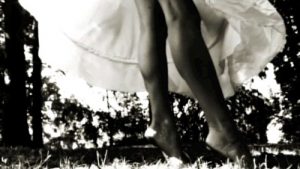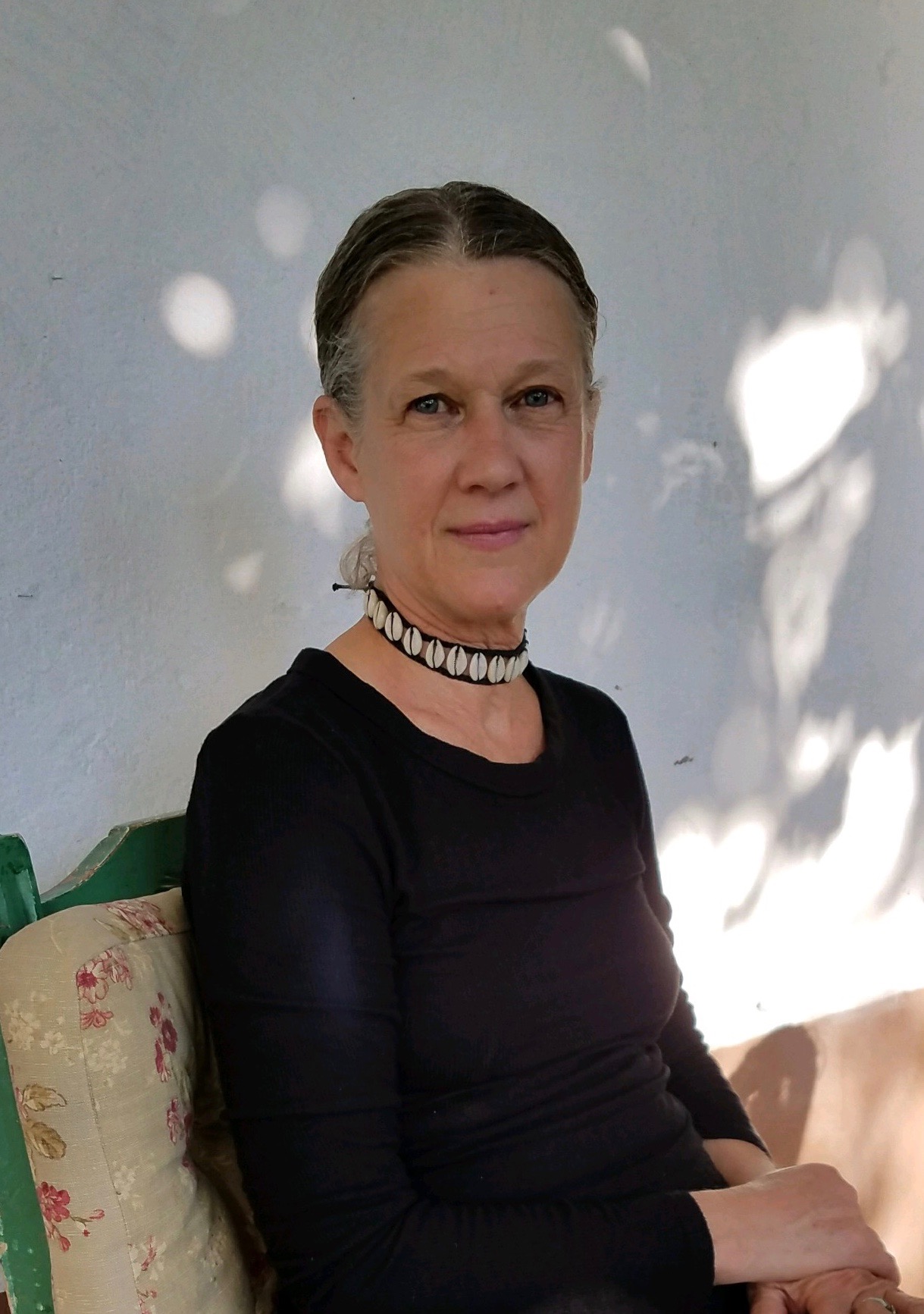ARTIST-IN-RESIDENCE
★ ★ ★ ★
JEAN FOGEL

The Heart Sees What Children See
And They See Everything
It seems the most accessible and effortless resource of unconditional love comes in childhood. The heart’s memory is in the blood.
I grew up in Texas during the sixties and seventies when civil rights was alive and moving. In the heart of Houston, beneath the overpass, I attended St Luke’s Catholic Middle School which was newly staffed with nuns from Ireland.
My mother was set on sending us to parochial school, which was expensive considering we had no financial status. I would work after school to pay my way. My siblings and I were the only pupils to work for our tuition. Students would rush through the doors leaving me to clean their prints off the windows. I would hurry through my chores hoping to catch the end of majorette practice.
South / Texas
No one ever really wants to go to Texas.
I didn’t.
I can still see the burning cross in the yard next door.
We were the last white family to leave the neighborhood.
At school, Sister Theresa from Ireland did her best to appear
non-discriminating, but she would choose me over
dark-skinned Mary every time. I was the only sixth grader
who could not find white shoes with heels for my confirmation,
I tried very hard to hide my chagrin. Looking back,
I recite the towns:
Sour Lake, Chinatown, Beaumont, Tyler, Irving, Houston, Austin,
synonymous with: Tumbleweeds, Shiner beer, cowboy hats, rifles,
rattlers, litter, two stepping, prejudice and the Rio Grande.
The Heart Does Not Judge
In grammar school, when we formed lines for recess or Mass, we were directed to choose a partner. As the new girl I would take the hand of the one person left standing alone. It is a memory full of heart, this making contact with the unwanted without the need to question. I just remember feeling grateful there was a hand to hold on to as we straggled out the door.
I Was Not There
If I could remember the days as they were, in whatever city I was in,
or whatever house we occupied, I would cross myself three times,
kneel, and pray at the foot of my mother’s bed.
If I could remember the schools, the people and their names,
I would draw a pen across my face, mark myself occupant,
noting I had lived there.
I would say that was me, the one with the braces. The one entering
a class where no one knew me, my body posturing in chairs, on stools,
as I developed sonar to navigate the world.
It wasn’t long before I began carrying my chair on my back.
Cement streets coiling and uncoiling beneath a forgotten sky,
birds nesting, and my haystack hair, no time for braiding.
The Heart Holds And The Heart Lets Go
It is experience itself that the heart translates, my own life having been deeply shaped by loss, loss of my father, sister, grandchildren, not through death but through circumstance. Any success I have had in managing my emotional landscape has come when I let go, when I give in, when the heart takes over and leads me into the pain.
Letting Go
The storm of yesterday
has made a nest
in my chest
Emotions bleed the heart
The heart says nothing
but yes
Birds in the piñon pine
are too busy for regret
they sing
This lesson of having
of not having
of letting go
The face moves
a million seconds
at once
The eyes and breath
assume the unseen
together
We hold the day
a crucible
a clue
Only the ordinary
tasks provide
the truth

The Heart Never Asks
When I was five, I would wake at 3 a.m. and make my way downstairs to the living room where my mother’s wing back chairs were waiting. I would climb into the chair and sit quietly. In the opposite chair was a shadowed figure, pure shadow, in the shape of a person. The feeling in the room was an unnameable peace.
I think innocence was the key to my heart centered capacity as a child. Now it takes more courage to see what the heart sees, because that leaves me empty handed, no position to wield, no power to impose, a point of stillness where the unknown appears and I find myself with an uncomfortable willingness, a strange and beautiful sort of creativity.
In a world of such calamity and confusion, the light continues to shine. The heart is a center that moves, from the dark into the light and back, cutting a pathway across all boundaries, often challenging our very identities, calling us to forgiveness and compassion through suffering. The pendulum may swing, but it always comes back to love.
Letter
I
By August the wheel will have turned three times.
The wasps on your back porch
will be peddling their healing poison
to sting, one pain for another.
In front of your house, a fallow garden,
silent with unplanted seeds. I think of you,
my hands in dirt, your barren yard sluggish
astride the neighbors’ flowering fields.
II
Under an apple tree, a milky cocoon
oscillates, nearing recognition.
The fairy hamlet at the foot of the tree
carries on without notice. An apple drops.
Screaming boys extirpate, the lawn sighs.
Standing in the poppy field behind your house,
a fatigued photo begs forgiveness.
III
I have been thinking of the family
I would like to have.
The effortless shape of water,
how the cicadas know when to sing.
The seasons loyal transformations.
But I will settle for dry husks, abandoned words,
beetles delivering messages,
their twig legs doing all the work.
IV
It was March when I last saw you.
Your bones stacked in the chair across from me,
blue eyes filling again and again
what could not be spoken.
Ceramic plates were the weights
that held us down, canted our folded bodies
toward the center of the table
between us.
V
I have learned to hold my words
in the thirsty hull of my mouth
like alligator eggs buried in the sand.
Celebrations of solstice pass without notice.
Church bells soothe my tired days.
A grandmother in exile, I rise each day
with a world on fire.
I remember you, the pale lid of morning,
your father’s hands appearing
as you touched your own face,
brushing away dreams, your body out the door,
feet shuffling in the grass.
And I a gatekeeper,
for this tethered distance we call home.

Born in New York, NY and raised in Texas, Jean Fogel Zee has been dancing, writing and working with the world as installation for over 30 years. The arc of Zee’s creative life is multi-disciplinary in form with a focus on poetry, dance, and the practice of Authentic Movement. Zee’s performance works have been supported by grants from the City of Austin, the Texas Commission on the Arts and the National Endowment for the Arts. She is presently Artist In Residence with The Historic Santa Fe Foundation in Santa Fe, NM. Her exhibit WORD Poetry / Installation premiered May 5 – May 28, 2017 at the Historic Santa Fe Gallery in Santa Fe, NM. Zee is currently working on her 2018 exhibition WIRED, as well as her one woman show WEEP – An Existential Comedy, both shows to be presented by spring of 2018.
ARTIST-IN-RESIDENCE

DEAR READER
At The Wild Word we are proud to present some of the best online writing around, as well as being a platform for new and emerging writers and artists.
As a non-profit, the entire site is a labour of love.
If you have read the work in The Wild Word and like what we do, please put something in our tip jar to keep this amazing platform alive.
THANK YOU FOR YOUR SUPPORT!
























That was fantastic. I really thought “The Heart Does Not Judge” was one of the best things I have ever read!
Thank you so much for the great article, it was fluent and to the point. Cheers.